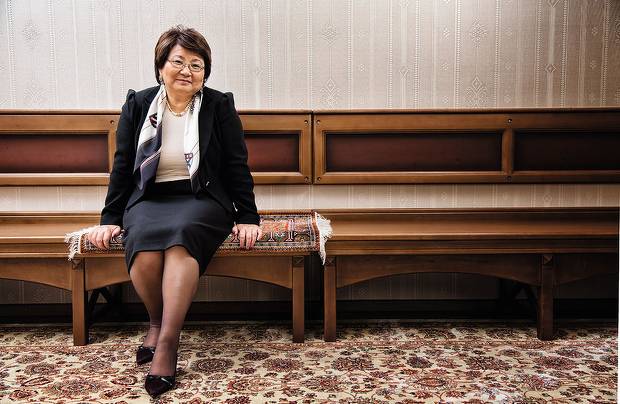Otunbayeva: It is imperative that every girl in Kyrgyzstan has the hope to be able to grow up to be someone like Bubusara.
January 24, 2016, 06:00
The Kyrgyz Republic Ex-president and organizer of the foundation The “Initiative of Roza Otunbayeva” International Public Foundation spoke about the results of her own Foundation’s work in 2015 and plans for 2016.
Roza Isakovna, why, as you have mentioned, “Violent extremism and radical ideology within religion has been aggressively forcing itself into our world, enticing young men, and even children and women to Syria, and because of this, as in the rest of the world, our society is searching unceasingly for ways to bridle such terrible actions”?
It is imperative that every girl in Kyrgyzstan has the hope to be able to grow up to be someone like Bubusara.
Education and art – only these are capable of crushing such dangerous forces I believe. Even in the West, where people are well fed and youth have access to food and entertainment, it is still a perioed of great fear for this society where a stream of young people are leaving to fight in a foreign war. But in the history of mankind, such terrible and sad things have happened before: poverty, war, plagues, epidemics throughout the world, societies in discord and distress—but only the consolidation of strengths and knowledge has allowed people to rise back up, get rid of the dangers, and continue on with life.
What precisely were the main results of The “Initiative of Roza Otunbayeva” International Public Foundation’s work in 2015?
We haven’t wavered in our Foundation’s main idea: a human being becomes a human at birth, it is necessary to invest in children from a very early age, after 3-5 years old, it’s almost too late. Seventeen people have been licensed to teach in the Montessori method. They have raised the level of education at their private kindergartens. This is not just a story of the 87 kindergartens operating in the jailoos in the summer of 2015 or reaching every last child, parent, and citizen in the farthest regions; it’s for all of us: early childhood developers, educators, university students, those in clubs, and volunteers from foreign countries. Annual city Education Festivals, monthly lectures on innovation in education at the Arabaev University campus, regular, continuing readings at the “Raritet” bookshop to instill a love of reading in children—the main thing is to not grow tired, and to patiently continue these arduous tasks. Because, education is not a single action—we are talking about the education of the next generation.
How should one fight to fundamentally improve education in Kyrgyzstan?
The Ministry of Education can’t do this alone. It’s much like how the Ministry of Health isn’t responsible for our individual health—they can’t keep all of us healthy. It’s essential that there be an overall education project for the country. Only the efforts of every community, every city, every village will bring this about. Yes, one-quarter of the budget is currently marked for education needs, but the effectiveness of these expenses is lacking. To speed up reforms in education, one must garner the support and participation of all of society for reorganizing the work of the university system, reducing the number of quasi-educational places, quickly implementing important programs in universities, and creating a rating system for universities. Reforms were declared a long time ago, more than half the school year passed, elections were held, but unnecessary, harmful activities are still seen within the university system. Courses in religion in schools and universities that have been approved by society have seen delays in implementation and this justifiably makes people worried.
Is it realistic for our educators to be able to operate without grants from foreign countries?
Currently, only one group of our schools is operating under a project by the UN Peacebuilding Fund that is working to unify our citizens with multilingualism, teaching programs seizing on the opportunities created by multiple ethnicities, dialogue between cultures, tolerance, peace, and friendship. The discussion and approval of the current national budget in the 2016 JK is clearly showing that next year, and over the next several years, we won’t be able to operate without the support of external grants. As a developing country, we need international support.
2016 marks the 90th birthday of the eternal Bubusara Beishenalieva
Therefore we want to gather all who are interested around the project “Women in Art.” Every girl in our country should grow with the hope that with art, they can be the next Bubusara. It would be great to open a Children’s Philharmonic within our National Philharmonic.
Now, at the beginning of the Year of History and Culture, how are cultural institutions working online?
Unfortunately, it is difficult to find sites for dozens of our cultural institutions—museums, theaters, and exhibition halls, and I can say for certain that the vast majority in Oblast centers don’t have anything online. All the while, illegal networks of “Islamic nations” are operating professionally and perniciously, preying on the weak, and reaching across thousands of kilometers to pull young people into war.